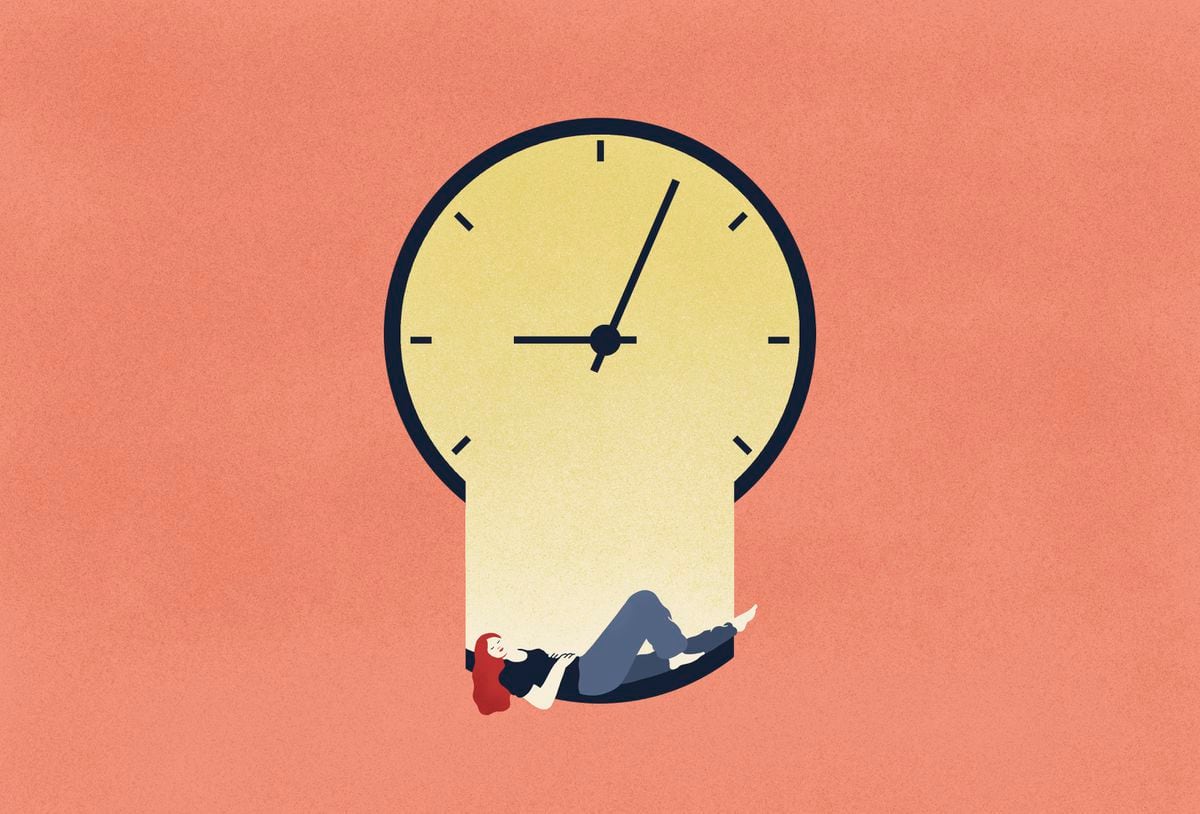Many will remember it.
In a custard ad from 1990 several children appeared who were asked what they wanted to be when they grew up and the last one, dressed in a suit that was too big for him, happily announced: "I want to be a boss when I grow up!" and he would put his feet on the table as if drawing a metaphor for the pleasure of commanding, the famous erotica of power.
Then a
voiceover
It announced: "If you want to grow up, eat as you please, take custard."
It may sound like a joke, but it's not a joke, you can see it on YouTube.
There is no doubt that the announcement had an effect and several of those creatures ate a lot of custard, grew up soon, fulfilled their dream and now happily exercise the celebrated Nietzschean will to power, wearing their stress proudly, like a conquest that vibrates on their mobile every ten seconds.
As the French sociologist Sandra Hoibian points out, in some places having a job at times of economic inflation is a symbol of social status.
It is not a simple contract with objectives;
It is the most effective way to add contacts and to mark distances with the rest.
Rest, retirement, on the contrary, are often treated as nonsense.
Taking advantage of the isolation in which the pause lives, the French essayist Alain Corbin has published in France
Histoire du repos
(history of rest), an invitation to live differently the relationship with fatigue and with time.
In his opinion, saying "I need to rest" is formulating a desire, a feeling as certain as an elementary need.
Or not, because, as he maintains, leisure has replaced rest.
Leisure occupies time and takes over space.
All this in a scenario in which more than 40 million people in the world (privileged in their way) left their jobs last year.
The phenomenon was called the Great Resignation (also called the Great Renegotiation, the Great Reshaping, or the Great Rethinking).
There were people who realized that they could find better ways to earn a living or not earn a living, for what?
More information
resignation from employment
In any case, the creators of that distant announcement may have missed a detail, because being a boss today is not the same as being a boss in the nineties.
There was no cell phone back then and perhaps the position, in addition to the desired high salary, offered two completely free days a week and several hours of the day and night.
Also, why fool ourselves, bosses without bosses there are very few.
There is much talk about the harmful consequences of the WhatsApp loop.
We already know that disconnection is relative and confusing.
We already know that writing an email in the park equals an incomplete message and a careless creature.
It matters little that this is a time of permanent stress (and, as Mark Fisher ventured, of "stress privatization") in which verbs such as rest or rest have been erased from the mental maps of the majority,
time to reach the objectives and the bonus with the acceleration of the technologies that came to make us gain time and on the contrary they take it away because we have to perform more.
It matters little that in 2021 the scientific journal
Environment International
established excessive work as the major factor in occupational disease, responsible for one third of all work-related diseases.
Or that another investigation by the World Health Organization (WHO) and the International Labor Organization (ILO) pointed out —as the BBC collected— that every year 750,000 people die of ischemic coronary disease and stroke due to long hours of work , which warns that today more people die from excessive work than from malaria.
Alain Corbin has already written a
History of silence
and he is a specialist in the history of sensibilities and in soundscapes in subtle books, as the French journalist Julie Clarini points out, which trace the elusive, seek to reconstruct the modalities of perception and the texture of emotions.
Thus, faced with the imperative of performance, Corbin's objective is to understand the distance that goes from the times in which rest was identified with health —that is, a state of happy eternity— to the great century of rest, which It extends between the last third of the 19th century and the middle of the 20th century, when the pleasant allegory of beaches is created, the therapeutic rest practiced in sanatoriums, paid vacations perceived as time destined to redeem the fatigue of work.
What happened between one moment and another?
The industrial Revolution.
'On the beach' (1873), by Édouard Manet.Leemage (Corbis via Getty Images)
In a conversation with Clarini herself in
L'Obs
magazine , Corbin assures that the current obsession with the need for rest appears with the arrival of factories.
Before, rest was established at work, the necessary short breaks were made.
Craftsmen and farmers produced their own time.
The multiple moments of rest made the work-rest alternation subtle.
With factories comes timed work.
A note that forces us to remember David Rooney's recent essay
A tiempo
(Alliance), a history of civilization through clocks, which recalls the importance of towers with clocks as control tools that also helped governments condemn laziness.
In the open air and in sight (not inside a church or a Town Hall) they exhorted not to waste time.
That did not fit with the idea of working for the God who would later provide another life.
To remember the sin of contemplation and the temptation of reluctance, pocket watches emerged that were called, of course, Puritan watches, everyday objects that incorporated disembodied discipline into the Protestant work ethic, personal watches that became owners and supervisors as they are today. our mobiles.
Well, as Lewis Mumford, great chronicler of urban modernity, pointed out:
It is with excessive work, what Corbin calls "surmenage", that legal rest is established and new concepts such as "leisure", "relax", "concentration" or "disconnect", and in turn the sciences of the spirit of the rest as a natural good.
An entire chapter is dedicated to the concept of stillness, a word that has fallen into disuse for the good of its opposite, restlessness, something undoubtedly symptomatic.
For Corbin, always influenced by his Catholic convictions, stillness is a kind of rest for the soul.
Stillness is the pure enjoyment of a presence.
It is evident that the idea refers to Pascal and the famous phrase that already sounds like a cliché: “All the misfortune of man comes from not knowing how to be at rest in a room”.
For Corbin, because the man hates facing his fate and his uncertain future, he seeks to distract himself.
Montaigne dedicates in the
essays
a chapter to retirement (which, although it may not seem like it, comes from jubilation) and warns that its greatest enemy "is ambition, since glory and rest are things that cannot live in the same house."
La Bruyère was also clear about it: “The best of all goods is rest.
Retirement and a place that is his domain.
Life is short and boring and it goes by while you want things.
Some time later, between the bourgeoisie and the artists, the paradox of Sunday rest flourished: the melancholic weight of Sunday afternoon.
Baudelaire was sensitive to this boredom, sometimes calling it
ennui
and other times
spleen
.
In the poem
The twilight of the night it is read
: “The day is falling.
A great peace fills the poor minds, tired from daily work, and their thoughts already take on the tender or indecisive colors of twilight.
Sunday, which began as the first day of the week, destined to go to mass and pray, led to boredom, a subject so eternal that even Juliette Grecó and Aznavour sang
Je hais les dimanches
(I hate Sundays) and Charles Trenet
Les enfants s'ennuient le dimanche
(children are bored on Sundays).
The playwright Sacha Guitry would affirm: "Never make love on Saturday night, because on Sunday if it rains you will no longer know what to do."
To analyze rest today we can go to Andrew Smart, an engineer at Google, who in his work
From him The art and science of doing nothing
, from 2013, wrote: “Certain brain networks become more active when you are not doing anything in particular, it is very important to let these moments happen.
It's like with physical exercise;
if you walk for a long time it is necessary to stop and rest.
If that principle is not applied to the brain, creativity and self-awareness are stifled."
Alex Soojung-Kim Pang, founder of Strategy and Rest, a Silicon Valley-based consulting firm that helps companies implement four-day work weeks, has published an article in
Psyche Guides
magazine on the subject titled
How to rest well.
: “Just as swimmers and Buddhist monks learn to use their breath to maintain energy or calm the mind, busy people must learn to rest in ways that help recharge their mental and physical batteries, and get a burst of energy. creative vision.
For this, it is necessary to develop new daily practices and think differently about rest”.
But, as usual, more contemporary is the always lucid Friedrich Nietzsche, who in
La gaya ciencia
predicted: “We reflected with the clock in hand.
We live like someone who endlessly torments himself for letting something slip away”, and “it seems that true virtue now consists in doing one thing in less time than another”.
That “better to do anything stupid than to do nothing” has become a principle.
Yes, Nietzsche saw it all coming, including the helplessness of man before the abyss of existence and work and the acceleration of time that modernity and its problems brought with it, which are today's, immediacy, WhatsApp.
In summary: if the industrial revolution brought the reduction of rest periods and the intensification of fatigue in the worker, among the privileged classes progress brought the possibility of a rest closely linked to the emptiness of time, to the cultivation of the self beyond the simple restoration of strength, to what today we call personal time and which refers to the original meaning of rest.
In
The Use of Life
(1895), Victorian author John Lubbock, financial innovator, leading archaeologist who coined the terms Neolithic and Paleolithic and used his wealth to save the ancient stone circle at Avebury (the world's largest henge). of the European Neolithic world, older than neighboring Stonehenge, on Salisbury Plain, England), and who, as a political reformer, led the campaign in favor of holidays, was very clear: "Rest is not idleness , and sometimes lying on the grass under the trees on a summer day, listening to the murmur of the water, or watching the clouds float by in the blue sky, is not at all a waste of time.”
Subscribe here
to the weekly newsletter of Ideas.










/cloudfront-eu-central-1.images.arcpublishing.com/prisa/KMEYMJKESBAZBE4MRBAM4TGHIQ.jpg)


